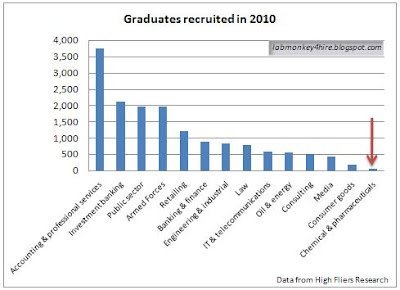 In total, almost two thirds enter professional employment and, as a class, business and finance were next behind science. This is not a surprise – anecdotally, the second most popular career choice after graduating with a chemistry degree is probably accountancy. Salaries are higher after training, career progression can be faster, and long-term prospects are more stable. Banking, finance and consultancy jobs offer even quicker routes to wealth, and their established companies often have graduate training programmes to ease the transition from science. And if you can crack investment banking, then you’re laughing.
In total, almost two thirds enter professional employment and, as a class, business and finance were next behind science. This is not a surprise – anecdotally, the second most popular career choice after graduating with a chemistry degree is probably accountancy. Salaries are higher after training, career progression can be faster, and long-term prospects are more stable. Banking, finance and consultancy jobs offer even quicker routes to wealth, and their established companies often have graduate training programmes to ease the transition from science. And if you can crack investment banking, then you’re laughing. Between them, the “Big Four” professional services firms have a revenue of almost $100bn, and employ over 600k people. The careers pages of Deloitte, PwC, Ernst & Young and KPMG all advertise graduate schemes, and have hundreds of positions open for experienced hires.
The importance of these graduate-recruiting behemoths should not be underestimated. High Fliers Research – an independent market research company - published their report “The Graduate Market in 2011” last month, which includes an analysis of the number of graduate jobs filled at “The Times Top 100 Graduate Employers” in 2010. Of the almost 16000 positions, only 56 were created by chemical and pharmaceuticals companies on the list, compared to over 3500 in accountancy and professional services.
But it’s not all about the money. Management is the next most popular option, with 7% of the job share, which is likely to include a significant proportion of graduates entering the civil service. Until recently this was viewed as the most stable of job options which, while not the highest paid, had a gold-plated pension scheme. The graduate fast stream programme still exists, but opportunities may be reduced during these austere times.
Between them, science, business, finance, management and the non-specific “other professional occupations” account for over half of all the chemistry graduates entering employment. Alternative technical professions include education, engineering, health and IT (almost 10% combined); and softer professions such as marketing, arts and social welfare (6%). Some careers - such as law - appear to be lower than expected, but this is because most people will continue study with a conversion course rather than directly entering employment in these fields.
The remaining one-third of graduates end up in non-professional occupations – the largest proportion in retail, catering, waiting and bar staff (over 1 in 8 of all chemistry graduates in employment). While some of these may be career choices, the survey unfortunately doesn’t expand upon this. As will be highlighted shortly, it is more likely that this high number masks a more significant and troublesome employment issue.
Next time: That’s all very well, but one year is just a snapshot – show me the trends!

Why is it that bankers prefer to hire those with chemistry degrees?
ReplyDeleteIt is clear that Chemist is not the most demanded sector but if you check out the salaries - it is not so bad - http://www.glassdoor.com/Salaries/chemist-salary-SRCH_KO0,7.htm - You will see that starting salary will be 25k/year and considering other sectors starting salaries 25k is not so bad.
ReplyDelete